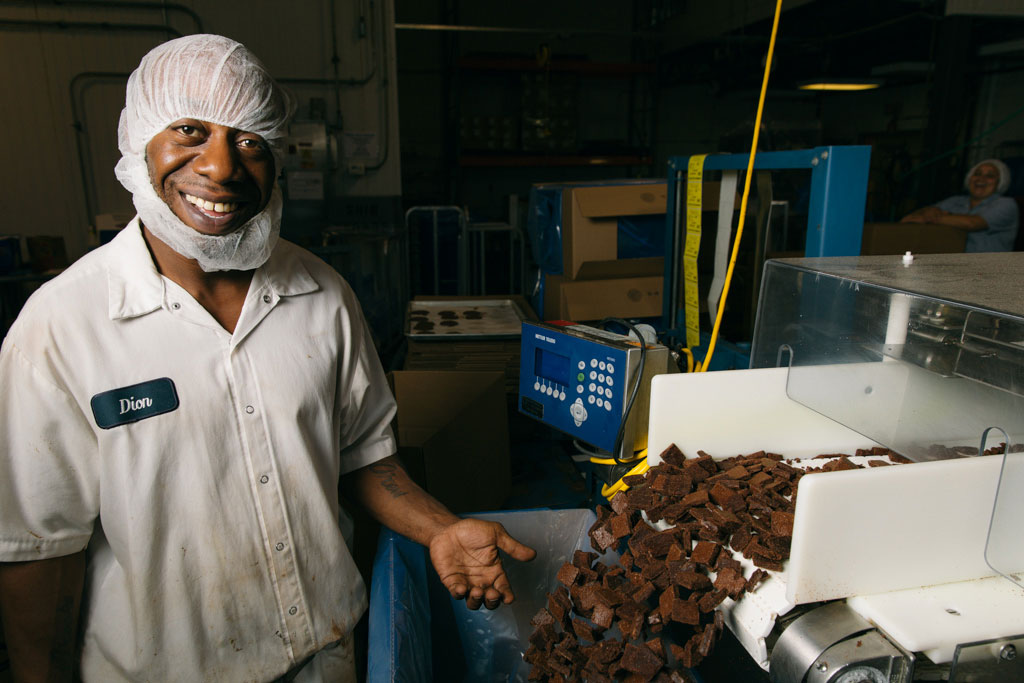Little did you know but that pint of Ben & Jerry’s Chocolate Fudge Brownie ice cream you polished off last night helped create jobs for people who face barriers to employment in a struggling section of Yonkers, outside New York City.
Ben & Jerry’s sources its brownies from Greyston Bakery in Yonkers, which turns out more than 30,000 pounds of the chewy goodies each day. Greyston’s thriving bakery business is hitched to a comprehensive set of local services that includes low-income housing, childcare, a computer learning center, HIV/AIDS health services and a half-dozen community gardens. Profits from Greyston Bakery go to the non-profit Greyston Foundation, which provides the social services.
The social mission is baked in to the business itself. Under Greyston’s “Open Hiring” policy, anyone who shows up ready and willing to work gets a chance, with no background checks or pre-hiring screening. That creates opportunities for the homeless, people with incarceration records or addiction problems, and many others facing employment barriers. New employees are supported through a 12- to16-week apprenticeship program.
“We are in an inner-city community, and there are a lot of people who need work in many of our cities across the country,” says Steven Brown, CEO of the Greyston Foundation. “The extent that we can create value and opportunity is the path out of distress for many of these communities.”
Greyston’s hybrid model demonstrates the impact social enterprises can have in local communities. Nearly one in six residents of Yonkers lives below the poverty line, and nearly one in four children under 18. The poverty rate is even higher in southwest Yonkers, where Greyston relocated in 1987 after five years in the Bronx.
The initial premise of Greyston Bakery was simple: to give people a means out of poverty and addiction and a path toward self-sufficiency through work. The founder, Bernard Tetsugen Glassman, was a former aerospace engineer leading a Zen Buddhist meditation group in a mansion in the Bronx. He saw an opportunity to help economically reinvigorate the surrounding community by selling muffins and scones. He later sold the mansion to support his vision.
Started in 1982 with $300,000 in seed money from friends and family, Greyston had fallen $400,000 in debt by 1988. The Ben & Jerry’s partnership that year was the game-changer. By late 1999, the company was turning a profit. Revenues from the bakery in 2012 were $10.1 million, up from $8.4 million a year earlier. Wages paid to the employees in the Yonkers area for all Greyston programs in 2012 topped $5 million.
With grants from corporations, foundations, government agencies and individuals for Greyston’s network of social services, total revenue for the bakery and the Greyston Foundation was $16.4 million.
In 2012, Greyston Bakery became the first legally recognized “benefit corporation” in New York, one of a growing number of states to legally recognize the corporate status of businesses that explicitly pursue measurable positive impacts on society and the environment as well as financial success. For-benefit corporations also pledge to operate with higher transparency and accountability to third-party standards.
“It’s added a whole new level of accountability to our operations,” says Ariel Hauptman, business development manager for Greyston Bakery and Benefit Corporation Committee chair. “There are a lot of companies or organizations today where it’s almost trendy to include mission work in their bottom line. But at Greyston, it’s something we’ve been doing for 32 years, and it’s cross sectional. It’s incorporated into every level of how we operate and run our business.”
Ben & Jerry’s, which was purchased by Unilever in 2000, is itself a registered benefit corporation in Vermont. Since Unilever’s purchase of Ben & Jerry’s, Greyston’s bakery sales have grown substantially. “It’s provided an opportunity to expand at the global level,” Hauptman says.
As a benefit corporation, Greyston undertook an effort to more systematically quantify its social impact. Its 2013 annual report, for example, says 67 people were trained through its Workforce Development program, which has served nearly 200 adults in total by teaching life skills and providing job training and placement. It also reports 181 people were offered full-time employment under the Open Hire program in 2013, though only about half that many are employed by the bakery at any given time. More dramatically, the report claims the county government saved $1.1 million through reduced recidivism as a result of the employment.
Greyston’s latest focus is on strengthening the Greyston brand and broadening partnerships with like-minded businesses. Greyston partners with Whole Foods Market and the Whole Planet Foundation to sell Greyston brownies at Whole Foods Markets. Retail sales for Whole Planet brownies accounted for around 2 percent of Bakery sales in 2012. For 2014, the goal is 10 percent.
Its broader goal is to work with its partners to implement Greyston’s inclusive, open-hiring practices and expand employment opportunities for disadvantaged populations. Says Hauptman, “It could be a game changer.”
[seperator style=”style1″]Impact[/seperator]
Financial: Greyston paid more than $5 million in wages and salaries to employees living in and around Yonkers, N.Y.
Social: Increased employment generated an estimated $1.1 million in county budget savings through reduced recidivism.
[seperator style=”style1″][/seperator]
Produced by ImpactAlpha and the Case Foundation.
One of a series of impact profiles produced in conjunction with the Case Foundation’s new publication, “A Short Guide to Impact Investing.”











